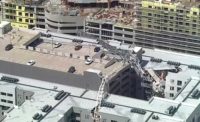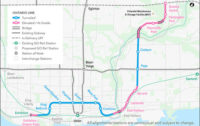Construction Disputes
Hartford Stadium Controversy Still Unresolved
Team and city say they are relying on surety, but its role remains unclear

An aerial view of the unfinished stadium for a minor league baseball team in Hartford, Conn. Photo courtesy of Hartford Yard Goats.
The Hartford Yard Goats and the city of Hartford, Conn., say Arch Insurance—the surety for the dual developer/prime contractor of the minor-league baseball team’s new, unfinished stadium—has committed to helping complete the project now that the team and its developer have acrimoniously split.
Officials from Arch could not be reached for comment to confirm what role the surety has agreed to play in completing the unfinished facility.
Stadium construction projects over the years have proven to be among the most troublesome construction risk management challenges.
The team owner and the developer-contractor are suing one another in state court in Hartford over the $63-million stadium project. It was supposed to be finished on May 17.
Josh Solomon, owner of the Hartford Yard Goats, has filed a $15-million countersuit against Centerplan, the contractor recently pulled off the construction of the Dunkin’ Donuts Park in Hartford. The countersuit also names as a defendant Centerplan's development partner, DoNo Hartford.
Solomon’s suit contends that numerous changes in the project should have come as no surprise to Centerplan, arguing that the contractor is simply trying to shift blame for the stadium fiasco, with the opening now pushed back a full year.
“DoNo and Centerplan tortiously and intentionally interfered with the BDA [Ballpark Development Agreement] and the Amendment to the BDA using improper means such as repeated and false statements and lies alleging that cost overruns and delays were occasioned by demands by the Ballclub,” wrote lawyers for the Yard Goats owner in a counterclaim filed in superior court in Hartford on Sept. 15.
Centerplan and DoNo filed their own $15-million lawsuit against the team’s owner this summer, arguing they were wrongfully terminated.
Centerplan kicked off work on the new ballpark in February 2015.
Over the course of the next several months, Centerplan made various changes and cuts in order to keep the project within its guaranteed maximum price of $54 million, the contractor contends.
The changes, though, were apparently unpopular with the city and the Yard Goats.
The team and the city “engaged in numerous meetings during which the Ballclub insisted on changes to the design, which increased the cost of construction,” the Centerplan and DoNo lawsuit contends.
Centerplan pushed back, arguing that the additional add-backs would bust the $54-million budget as well as the March 11 deadline for completing the new ballpark.
Centerplan, the ballpark owner and city officials in January hammered out an agreement to boost by $2 million the ultimate price tag of the $54 million-project and extend to May 17 the construction completion deadline.
But the same pattern happened all over again, Centerplan contends, with city officials and the Yard Goats holding meetings and then demanding changes to the ballpark design.
In a series of five “construction change directives,” the owner of the Yard Goats and city officials demanded extensive electrical and cable work, notes the Centerplan and DoNo lawsuit.
In particular, the team and the city called for “changes to exterior lighting and signage; requiring changes to electrical and plumbing plans; requiring additional structural supports for signage, entry gates, and waterproofing; and the addition of television locations and requisite electrical lines and cabling required for those televisions,” says the Centerplan and DoNo lawsuit.
A Different Perspective on the Construction Dispute
But lawyers for Yard Goats owner Solomon offered a much different take on the dispute.
As part of the development agreement, the ball club had the right to request changes as long as they were cleared in advance by the city and backed by the team's funding, Solomon’s countersuit contends.
During the first nine months of construction, Centerplan offered no advanced warning that there were serious issues with either the budget or the timetable of the ballpark project, the countersuit contends.
To the contrary, Centerplan and its development partner, DoNo, stated “repeatedly” that “the Stadium would be completed on time and within the GMP as a result of value engineering done by Centerplan.”
In December, the contractor suddenly demanded another $10 million and a deadline extension to complete the ballpark; that move led to the January agreemen, which pushed back the stadium’s completion to May while adding $2 million to the budget.
But lawyers for the Yard Goats owner contend that Centerplan and DoNo agreed to the new May 17 deadline in bad faith, “repeatedly” stating it would be met “when they knew it could not be met.”
As spring arrived and the deadline for completion loomed, Centerplan and its development partner tried to shift the blame, engaging “in a public relations campaign aimed at the Ballclub claiming (erroneously) that their failure to perform their obligations was the result of changes to the design demanded by the Ballclub,” the countersuit reads.
While Arch Insurance has reached an “agreement in principle” to finish the project, according to the team, the project's future remains unclear.
Although Arch could bring Centerplan back to complete the project, that seems unlikely, given the vitriolic legal salvoes exchanged by both sides.
The Yard Goats have acknowledged meeting with a key subcontractor, John Moriarty & Associates Inc., in July but deny Centerplan’s allegations on the subject of the meeting. In particular, Centerplan alleges that city officials suggested that Solomon, the Yard Goats owner, and Moriarty, the former sub, get in contact with other subs to go to work under Moriarty as the general contractor.



